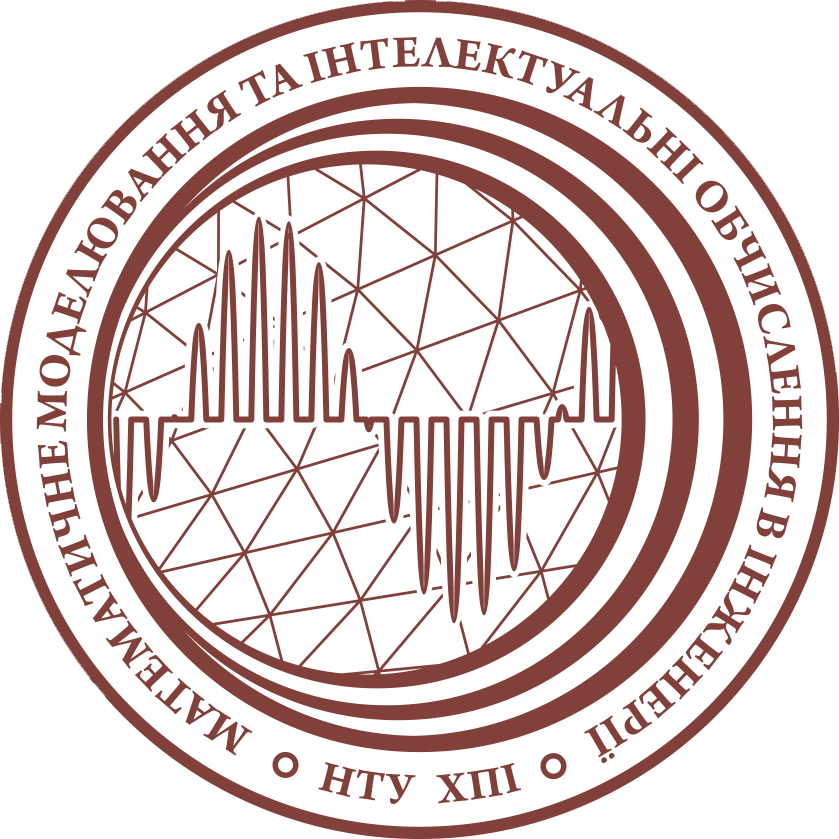HISTORY OF THE DEPARTMENT OF MATHEMATICAL MODELING AND INTELLIGENT COMPUTATION IN ENGINEERING

The history of the Department of Mathematical Modeling and Intelligent Computation in Engineering (Dynamics and Strength of Machines) dates back to 1930 when the specialty “Dynamics and Strength of Machines” was established at the Kharkiv Mechanical and Machine-Building Institute. This specialty became the first educational program in Ukraine to combine physical and mathematical training with practical engineering skills. This approach later gained worldwide recognition as the “PhysTech” system.
The founders of the specialty were prominent scientists: Abram Fedorovich Ioffe, Ivan Vasyliovych Obreimov, Kyrylo Dmytrovych Synelnykov, and Ivan Mykhailovych Babakov.
The department provides education in the specialties of “Applied Mathematics” and “Computer Science” at the bachelor’s and master’s levels, as well as within the framework of PhD training.
- The main focus of training in the “Applied Mathematics” specialty is aimed at preparing specialists with in-depth knowledge and high qualifications in mathematical and computer modeling of objects, processes, and phenomena of physical nature. These skills are applied in conducting applied research in innovative engineering and scientific activities.
- The main focus of training in the “Computer Science” specialty is on the comprehensive preparation of computer science specialists, with an emphasis on developing deep understanding and high qualifications in key aspects of computer science. This includes conceptual design of mathematical and algorithmic models and their practical implementation in the form of software code.The program emphasizes the development of competencies necessary for designing digital models and simulations, managing intelligent systems and robotics, as well as studying advanced methods of data visualization and computer graphics. Significant attention is given to mastering modern tools for modeling, designing, developing, integrating, and maintaining IT products and services, including systems for efficient data storage, analysis, and processing.
The department is a leading center for scientific research, focusing on the following research areas:
- “Development of methods for designing functional anisotropic composite materials” (scientific supervisor: D.Sc., Prof. Gennadii Lvov).
- “Development of methods for strength, vibration, and damage analysis in machine dynamics and strength problems” (Ph.D., Assoc. Prof. Volodymyr Gryshchenko, Ph.D., Assoc. Prof. Oleksandr Trubaiev, and Ph.D., Assoc. Prof. Viktor Fedodrov).
- “Forced nonlinear vibrations of a turbine blade package with dynamic contact,” “Probabilistic modeling of structural failures for predicting the reliability of machine-building elements,” “Stochastic dynamics of vibration protection systems with nonlinear suspension” (scientific supervisor: D.Sc., Prof. Oleksii Larin).
- “Complete combined magnetic suspension of shafts and rotors in passive and active magnetic bearings,” “Dynamics of systems with combined mechanical, passive, and active magnetic elements for vibration protection and isolation,” “Biomechanical computer design and modeling” (scientific supervisor: D.Sc., Prof. Gennadii Martynenko).
- “Information technologies for analyzing and synthesizing the structure of new materials to predict their physical properties,” “Algorithms for image analysis of microstructures of heterogeneous materials to predict their mechanical behavior” (scientific supervisor: Ph.D., Assoc. Prof. Oleksii Vodka).
The modern department is the result of a strong academic history, shaped over the past 100 years through the development of scientific schools and academic traditions. These foundations were established by outstanding scientists, including V.M. Maizel, A.P. Filippov, S.I. Bogomolov, I.M. Babakov, A.V. Burlakov, Ye.G. Holoskoko, V.B. Hryniov, O.K. Morachkovskyi, H.I. Lvov, V.O. Zhovdak, O.O. Larin, H.Yu. Martynenko, O.I. Trubaiev, O.O. Vodka, V.O. Fedorov, and V.M. Hryshchenko.
A special mention should be made of Ph.D., Senior Researcher Mykhailo Smirnov and Ph.D., Senior Researcher Yurii Ulyanov, who made invaluable contributions to the development of experimental research methods in the department. Additionally, Ph.D., Assoc. Prof. Aleftyna Zhuravliova played a significant role in advancing theoretical research on the dynamics of complex mechanical systems.

Veniamin Mykhailovych
Maizel

Anatolii Petrovych
Filippov

Serhii Ivanovych
Bohomolov
History and Leadership
Until 2022, the department was known as the Department of Dynamics and Strength of Machines and was led by distinguished scientists:
Veniamin Mykhailovych Maizel (1936–1941) – Corresponding Member of the Academy of Sciences of the Ukrainian SSR.
Anatolii Petrovych Filippov (1948–1960) – Academician of the Academy of Sciences of the Ukrainian SSR.
Serhii Ivanovych Bohomolov (1960–1991) – Prof., D.Sc., Honored Scientist of Ukraine, twice awarded the State Prize of Ukraine in Science and Technology.
Gennadii Ivanovych Lvov (1992–2020) – Prof., D.Sc., Laureate of the H.S. Pysarenko Prize of the National Academy of Sciences of Ukraine.
Since 2020, the department has been headed by Oleksii Oleksandrovych Vodka, Ph.D., Laureate of the President of Ukraine Award for Young Scientists.

Gennadii Ivanovych
Lvov

Oleksii Oleksandrovych
Vodka
International Collaboration and Research Development
The department actively engages in domestic and international research projects across various scientific domains. It maintains strong partnerships with universities across the European Union, including Latvia, Germany, and other countries. Committed to advancing science, the department fosters the growth of new talented researchers.
Over the years, a significant number of dissertations have been successfully defended at the department, leading to the awarding of Ph.D. (Doctor of Philosophy) and Doctor of Technical Sciences degrees.





As a leading center for training specialists in mathematical modeling, the department upholds the strong traditions of its scientific school while integrating cutting-edge technological solutions into education and research.
